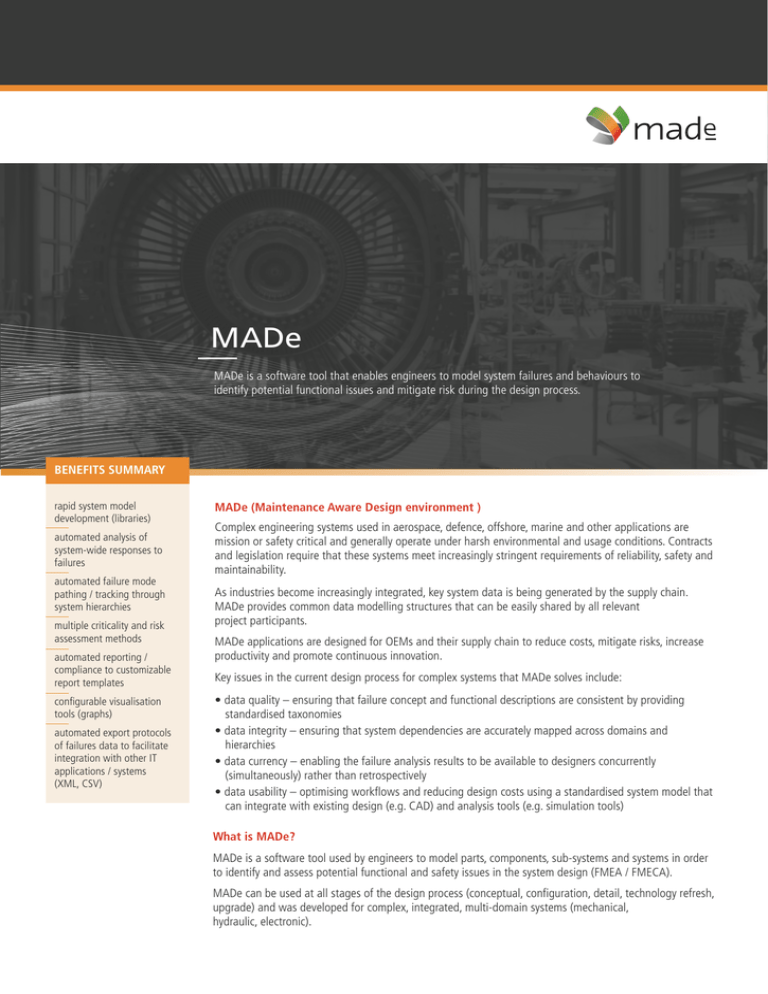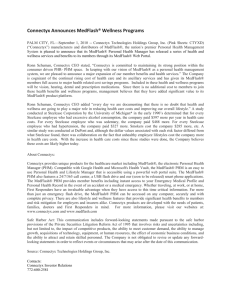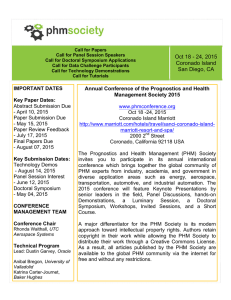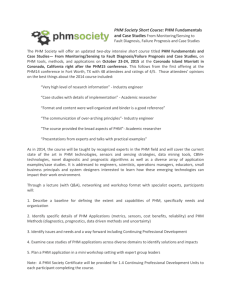MADe is a software tool that enables engineers to model system
advertisement

made MADe MADe is a software tool that enables engineers to model system failures and behaviours to identify potential functional issues and mitigate risk during the design process. BENEFITS SUMMARY rapid system model development (libraries) automated analysis of system-wide responses to failures automated failure mode pathing / tracking through system hierarchies multiple criticality and risk assessment methods automated reporting / compliance to customizable report templates configurable visualisation tools (graphs) automated export protocols of failures data to facilitate integration with other IT applications / systems (XML, CSV) MADe (Maintenance Aware Design environment ) Complex engineering systems used in aerospace, defence, offshore, marine and other applications are mission or safety critical and generally operate under harsh environmental and usage conditions. Contracts and legislation require that these systems meet increasingly stringent requirements of reliability, safety and maintainability. As industries become increasingly integrated, key system data is being generated by the supply chain. MADe provides common data modelling structures that can be easily shared by all relevant project participants. MADe applications are designed for OEMs and their supply chain to reduce costs, mitigate risks, increase productivity and promote continuous innovation. Key issues in the current design process for complex systems that MADe solves include: • data quality – ensuring that failure concept and functional descriptions are consistent by providing standardised taxonomies • data integrity – ensuring that system dependencies are accurately mapped across domains and hierarchies • data currency – enabling the failure analysis results to be available to designers concurrently (simultaneously) rather than retrospectively • data usability – optimising workflows and reducing design costs using a standardised system model that can integrate with existing design (e.g. CAD) and analysis tools (e.g. simulation tools) What is MADe? MADe is a software tool used by engineers to model parts, components, sub-systems and systems in order to identify and assess potential functional and safety issues in the system design (FMEA / FMECA). MADe can be used at all stages of the design process (conceptual, configuration, detail, technology refresh, upgrade) and was developed for complex, integrated, multi-domain systems (mechanical, hydraulic, electronic). The MADe Suite Reliability Availability Maintainability AM MADe R HM MA De eP AD M Functional Design Detailed Design Failures database Analysis PHM System Design PHM System Assessment Fault Detection and Isolation Maintenance Actions SYSTEM MODEL SYSTEM MODELS DATABASE Why use MADe? As mission and safety critical systems become increasingly complex engineers require advanced technology tools to generate and manage failure data and provide analysis for decision support. It is important to establish and maintain system data for multiple configurations of a platform efficiently and cost effectively - MADe provides the necessary tools and database to do this. Functional dependency modelling Consistent functional and failure concept taxonomies Criticality methods Standardisation of the dependency modeling mitigates potential human error and ensures a greater degree of confidence for all participants in the design process. MADe automatically simulates system-wide responses to failures through system hierarchies, using fuzzy cognitive mapping and bond graph simulations (real time). This enables failure analysis to be conducted concurrently with system design. MADe prevents problems associated with linguistic interpretation for functional relationships by enforcing a clearly defined vocabulary for functions and failure concepts. Synonyms for terms are provided with illustrative examples to assist the user in ensuring accurate and consistent usage of the taxonomy. Systems may be designed and used in many different countries so the consistency and clarity of language in the system failures database is increasingly important. MADe provides a number of different criticality & risk analysis approaches to rank functional failure modes or redesign, maintenance or other corrective action, in order of priority or criticality, based on how they develop and the system responses they generate. Methods of assessment include: Risk Priority Number (RPN), Criticality Number, Criticality Assessment Index and Fuzzy Criticality Analysis. Reusable, scalable system models The MADe Library of parts, components and systems uses embedded functional relationships and failure diagrams (visual and text based representations of failure concepts) to be stored and reused to enable rapid iterations of system modelling for configuration analysis and trade studies. Generic component and part libraries are supplied, and can be easily generated and reused or customised by the user for specific projects, platforms or customers. QUALITY OF DESIGN AWARENESS OF POTENTIAL FAILURE EFFECTS SYSTEM RELIABILITY QUALITY OF DESIGN Benefits Summary Feature Summary Key benefits of MADe include: • rapid system model development • automated analysis of system-wide responses to failures • automated failure mode pathing / tracking through system hierarchies • automated reporting / compliance to customizable report templates • configurable visualisation tools (graphs) • automated export protocols of failures data to facilitate integration with other IT applications / systems Key features of MADe include: • detailed failures databases for parts, components, assemblies and systems • library of parts, components and systems that is extensible & reusable • standardised taxonomy of failure concepts • standardised taxonomy of functions • a structured framework for modelling system functional dependencies DESIGNER COMPONENT / SYSTEM DESIGN PHM ANALYST CONCEPTUAL DIAGNOSTIC CAPABILITY PROGNOSTIC CAPABILITY REASONING MODELS FUNCTIONAL FAULT ISOLATION DETECTION UPGRADES TRADE STUDIES PHM SYSTEM DESIGN DESIGN DATA CRITICAL COMPONENTS IDENTIFIED MAINTENANCE DATA LOGISTICS & MAINTENANCE RISK DATA CRITICALITY MONITORING METHODS RAM ANALYST SYSTEM MODEL FAILURE MODES CRITICALITY UPDATING DATABASE REPORTS AUDIT TRAIL RELIABILITY DIAGNOSTIC & PROGNOSTIC PROGRAMS MADe (Enterprise version) MADe can be customised to meet the specific internal processes of a client, including configuration management, design approvals, knowledge management, PLM and QA. Customisable features include user access rights (e.g. design authority), data segmentation (internally or from the supply chain) and reporting formats. For enterprise implementations, specific application program interfaces can also be developed or provided to facilitate automated legacy data capture (e.g. CAD data), ensuring that the data MADe generates integrates with the organisation tool suite of other engineering tools. made MADe software PHM Technology provides data generation and decision support tools that enable designers and discipline specific engineers to achieve concurrent engineering. The Maintenance Aware Design environment (‘MADe’) is an integrated suite of software tools designed to meet the practical engineering requirements of design, RAM and PHM. The other modules that make up the MADe suite are: • MADe RAM (Reliability Availability and Maintainability) used to generate and analyse system reliability, availability and maintainability assessments • MADe PHM (Prognostics and Health Management) used to design and assess diagnostic, prognostic and health management systems and capabilities MADe offers significant engineering, productivity and process improvements over existing customer solutions, and can be implemented on a single user, network or supply chain basis. PHM Technology Services PHM Technology provides value-added support and integrated services to ensure that the implementation of MADe for projects, programs and organisations is successful and that customer goals are met. The services provided by PHM Technology and its technical partners include: - Project Management - Data Migration - Training - Technology Consulting - Solutions Delivery - Customer Support Company Overview PHM Technology (est. 2006) is an advanced engineering technology company that has developed a range of decision support tools for complex engineering systems that are mission / safety critical. While MADe is a stand-alone application, enterprise versions can be customised to meet the specific process requirements and protocols of OEMs and their supply chains. The first customer for MADe was the Joint Project Office of the JSF program. MADe now has users in the EU, UK and US. Quality Products and Services PHM Technology understands that its customers require reliable long term software solutions to support complex business and engineering needs. PHMTechnology PHM Technology is committed to delivering high quality software products and services to its customers. Head Office: Level 1 / 15 Pickering Road Mulgrave, Victoria 3170 Australia Phone Australia - (03) 9561 0700 International - (+61) 9561 0700 Fax: Australia - (03) 9561 0199 International - (+61) 9561 0199 www.phmtechnology.com




